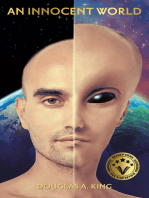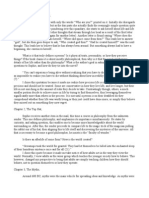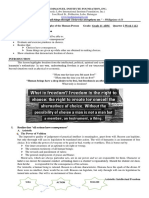Critical Lens
Critical Lens
Uploaded by
Kymbali BryantCopyright:
Available Formats
Critical Lens
Critical Lens
Uploaded by
Kymbali BryantCopyright
Available Formats
Share this document
Did you find this document useful?
Is this content inappropriate?
Copyright:
Available Formats
Critical Lens
Critical Lens
Uploaded by
Kymbali BryantCopyright:
Available Formats
CRITICAL LENS: JACK AND THE BEANSTALK The story of Jack and the Beanstalk according to (Jacobs) is about
a poor, young boy whose fortune changed after he got some magic beans in exchange for his mothers cow which she had given him to sell. Jacks mother thought the beans were useless so she threw them outside, the next day the beans grew into a giant plant which climbed higher than the clouds. Upon climbing the plant Jack came across the house of an ogre that ate little boys. He got rich by tricking the ogres wife and stealing from the ogre. On his third attempt to rob the ogre he almost got caught so he had to kill the ogre by chopping down the beanstalk. The theory that will be used to critically analyse the story Jack and the Beanstalk is the theory of existentialism. According to theorist Jean-Paul Sartre the theory of existentialism can be defined by the slogan Existence precedes Essence. He further explains this by saying that as humans We are thrown into existence first without a predominant nature and only later do we construct our own nature or essence through our actions. (Whitehawk) Defines existentialism as a philosophy concerned with finding self and the meaning of life through free will, choice and personal responsibility. Therefore existentialism deals with human existence and the choices an individual makes in order to survive. Existentialism has three main characteristics facticity, anxiety and despair. There are several concepts to consider when defining existentialism. Sartre believes that this theory is based mainly on human free will or freedom of choice. This freedom of choice is an individuals ability to make his/her own decisions. Another important concept of existentialism is that decisions are not without stress and consequences. In applying the theory to the story above special attention will be given to the main character Jack and the choices he makes in order to achieve wealth. In Joseph Jacobs version, Jack expresses freedom of choice throughout most of the story. He first expressed this freedom at the beginning of the story where he thoughtlessly exchanged his mothers cow for five small beans. The man with the beans did not force or threaten Jack to take them, he did so of his own free will. In his research (Banach) wrote that freedom of choice is not only advantageous but it also has disadvantages. In the story even Jacks mother thought he had made a foolish decision and as a result she did not give him anything to eat that night. As stated above people sometimes try to create or construct their own nature or essence through their actions. In the story Jack seemed to be trying to create a world in which both he and his mother could survive comfortably and as a result he made a quick decision to take the easy way out. Instead of trying to sell the cow he exchanged it for some beans which he was told were magical. Jacks expression of freedom of choice would seem to many as a foolish decision. Jacks decision to create his own nature can be recognized as one of the three characteristics of existentialism. This characteristic is anxiety. Anxiety deals with our responsibility to choose and create our own nature and values even though we lack as external sources of value and determination (Banach). In the story Jacks decisions do lead to consequences. During his strife to obtain a better standard of living for himself and his mother Jack made some crucial choices which lead to several near death experiences. These actions speak to another concept of existentialism which was that decisions are not without stress and consequences. This concept was explained by (Whitehawk) to mean that some choices which we make as individuals turn out to lead to several consequences. When Jack first climbed
the beanstalk he did so mainly out of curiosity so he did not consider the risks that went with his decision. The other times he climbed the beanstalk, however, he was well aware of all the risks/consequences and he still made the choice. This decision to climb the beanstalk even though he knew the risks can be compared to another characteristic of existentialism. This characteristic is despair. (Banach) Describes despair as the contrast between the world were thrown into and the one we wish to create but we still restrict ourselves to what is under our own control. Since Jack was born in a poor family he wanted to uplift himself and in order to do so he made some risky decisions. As a result he did have some challenges which he overcame in the end.
Works Cited Banach, David. "Summary of Some Main Points from Sartre's Existentialism and Human Emotions." September 2006. St. Anslem College Web site. September 2011 <http://www.anslem.edu/homepage/dbanach/sartrelecture.htm>. Jacobs, Joseph. "Jack and the Beanstalk." 27 September 2003. Rick Walton's Online Library. September 2011 <http://www.rickwalton.com>. Whitehawk, Shamyn. "My Little Corner of Existentialism ." 1998. Fortune City. September 2011 <http://www.fortunecity.com>.
You might also like
- The Myth of Self Esteem How Rational Emotive Behavior Therapy Can Change Your Life Forever PDFDocument316 pagesThe Myth of Self Esteem How Rational Emotive Behavior Therapy Can Change Your Life Forever PDFEnmanuel Alexander Pumacayo Saico100% (2)
- Rollo May The Discovery of Being NotesDocument16 pagesRollo May The Discovery of Being Notesnitsuj888No ratings yet
- Comparison Essay. Never Let Me Go vs. GattacaDocument3 pagesComparison Essay. Never Let Me Go vs. GattacaAlexander Clarke100% (5)
- The Ends of Human ActDocument5 pagesThe Ends of Human ActEpoditmas Seyer100% (1)
- How to Grow a Human: Adventures in How We Are Made and Who We AreFrom EverandHow to Grow a Human: Adventures in How We Are Made and Who We AreRating: 4.5 out of 5 stars4.5/5 (3)
- Annotated Bibliography English LiteratureDocument5 pagesAnnotated Bibliography English LiteratureKellen KathureNo ratings yet
- Lord of The Flies Critical Analysis EssayDocument10 pagesLord of The Flies Critical Analysis EssayVijaen Cool விஜயன்75% (4)
- Road. He Argues "ThatDocument9 pagesRoad. He Argues "Thatapi-358150445No ratings yet
- Never Let Me Go Comparative Essay 2022Document3 pagesNever Let Me Go Comparative Essay 2022Ibrahim Abdulkadir JumaNo ratings yet
- Choice and The Ultimate Incurable-Renata SaleclDocument14 pagesChoice and The Ultimate Incurable-Renata SaleclBarıs BasaranNo ratings yet
- MindwalkDocument6 pagesMindwalklenin1989No ratings yet
- Existentialism and Modern Literature: An Essay in Existential CriticismFrom EverandExistentialism and Modern Literature: An Essay in Existential CriticismNo ratings yet
- Where Did: I Come From?Document8 pagesWhere Did: I Come From?volminkNo ratings yet
- Brooke Trisel Intensedand Unintended LifeDocument7 pagesBrooke Trisel Intensedand Unintended LifeAbby BakerNo ratings yet
- Frankenstein AnalysisDocument4 pagesFrankenstein AnalysisAhmad ShadiqiNo ratings yet
- The Road EssayDocument6 pagesThe Road Essayapi-358150445No ratings yet
- Myth and MeaningDocument5 pagesMyth and MeaningDave TrolandNo ratings yet
- GoodvsevilessayroyparkDocument4 pagesGoodvsevilessayroyparkapi-312731353No ratings yet
- Faggot ClubDocument3 pagesFaggot ClubTim ChaseNo ratings yet
- Wallace BR PDFDocument1 pageWallace BR PDFRaeNo ratings yet
- Post GenderismDocument8 pagesPost Genderismjeroe12No ratings yet
- Sowing Utopia Feminist Community in Octavia Butler's Wild SeedDocument47 pagesSowing Utopia Feminist Community in Octavia Butler's Wild SeedIsabella SouzaNo ratings yet
- Does Struggle Make Us Human?Document5 pagesDoes Struggle Make Us Human?MattYancikNo ratings yet
- Bear Boy: The True Story of a Boy, Two Bears, and the Fight to be FreeFrom EverandBear Boy: The True Story of a Boy, Two Bears, and the Fight to be FreeRating: 5 out of 5 stars5/5 (1)
- Fringe - Parallel LivesDocument5 pagesFringe - Parallel LivesJosé Manuel Bueso FernándezNo ratings yet
- Zombies - Scratching The SurfaceDocument4 pagesZombies - Scratching The SurfaceefadfaNo ratings yet
- Is Human Nature Fundamentally Selfish or AltruisticDocument5 pagesIs Human Nature Fundamentally Selfish or Altruistic文光No ratings yet
- Matter, Life, Consciousness, etc.: Second Addendum to Important ThingsFrom EverandMatter, Life, Consciousness, etc.: Second Addendum to Important ThingsNo ratings yet
- Bloodchild 7Document8 pagesBloodchild 7DiedraRoizNo ratings yet
- A2 Queerpess KDocument7 pagesA2 Queerpess KowenlgaoNo ratings yet
- A Children's BibleDocument2 pagesA Children's Biblenela.piNo ratings yet
- Identity Humanity and Bioethics PhilosopDocument17 pagesIdentity Humanity and Bioethics Philosopsforia7No ratings yet
- WipeoutDocument6 pagesWipeouthilariousperaltaNo ratings yet
- Thesis About Fate Vs Free WillDocument4 pagesThesis About Fate Vs Free Willcdayxnzcf100% (1)
- Gender: Baby and Child Care (1944), A Manual by DR Benjamin SpockDocument1 pageGender: Baby and Child Care (1944), A Manual by DR Benjamin SpockLenkaNo ratings yet
- Midway Review Part 1Document3 pagesMidway Review Part 1kolbe1walshNo ratings yet
- Download The Biopolitics of Gender in Science Fiction Feminism and Female Machines 1st Edition Emily Cox-Palmer-White ebook All Chapters PDFDocument65 pagesDownload The Biopolitics of Gender in Science Fiction Feminism and Female Machines 1st Edition Emily Cox-Palmer-White ebook All Chapters PDFalmonblyze3s100% (5)
- Abdul Gayley Lecture D4.3Document27 pagesAbdul Gayley Lecture D4.3Marques ReddNo ratings yet
- Ecofeminism Ursula PDFDocument51 pagesEcofeminism Ursula PDFLorena GNo ratings yet
- A Hand in Our FutureDocument8 pagesA Hand in Our FuturemorganashleyNo ratings yet
- AP English - Sophie's WorldDocument14 pagesAP English - Sophie's WorldArtur Soho SotskovNo ratings yet
- Mindful Medicine: Myth & Archetype in FilmDocument15 pagesMindful Medicine: Myth & Archetype in Filmckeitz714No ratings yet
- Storytelling and Critical Thinking PDFDocument6 pagesStorytelling and Critical Thinking PDFadnartNo ratings yet
- Final Paper Finished ProductDocument12 pagesFinal Paper Finished Productapi-307966632No ratings yet
- Moch - Rizky Rivaldy - 19111040 - PROSA UASDocument4 pagesMoch - Rizky Rivaldy - 19111040 - PROSA UASMyra GrayNo ratings yet
- Voices for Animal Liberation: Inspirational Accounts by Animal Rights ActivistsFrom EverandVoices for Animal Liberation: Inspirational Accounts by Animal Rights ActivistsRating: 5 out of 5 stars5/5 (2)
- English Frankenstein EssayDocument6 pagesEnglish Frankenstein EssayJordan LeNo ratings yet
- Essay AP Lit Frankenstein 1818 by Mary ShellyDocument2 pagesEssay AP Lit Frankenstein 1818 by Mary Shellysoelsolis0No ratings yet
- Waiting For Godot A Solution To ExistentDocument7 pagesWaiting For Godot A Solution To ExistentSrimenta MandiNo ratings yet
- Life as No One Knows It: The Physics of Life's EmergenceFrom EverandLife as No One Knows It: The Physics of Life's EmergenceRating: 4 out of 5 stars4/5 (8)
- Mythic Living: Thoughts on Everyday Life in Mythological LightFrom EverandMythic Living: Thoughts on Everyday Life in Mythological LightRating: 5 out of 5 stars5/5 (1)
- Mice and Men Naturalism Web SiteDocument10 pagesMice and Men Naturalism Web SitedrooolNo ratings yet
- English Essay: Measure of A ManDocument4 pagesEnglish Essay: Measure of A ManMegan Nichol DurbinNo ratings yet
- EislerDocument7 pagesEislertimclarkdre100% (1)
- Discerning Life: The Experience of EvilDocument11 pagesDiscerning Life: The Experience of EvilStavros LiudovNo ratings yet
- Dystopian Essay AwaDocument3 pagesDystopian Essay Awaawa.konateNo ratings yet
- Excellent Example of ISU EssayDocument9 pagesExcellent Example of ISU EssaytoorgnayrNo ratings yet
- Transforming Despair: Organic Philosophy in an Age of Meds, Algorithms, and PandemicsFrom EverandTransforming Despair: Organic Philosophy in an Age of Meds, Algorithms, and PandemicsNo ratings yet
- YellowDocument2 pagesYellownutbihariNo ratings yet
- Existentialism Kevin AhoDocument22 pagesExistentialism Kevin AhoKeith Joshua AgmaliwNo ratings yet
- Freedom of The Human PersonDocument10 pagesFreedom of The Human PersonKen Tuazon100% (1)
- The Nature of Epiphanic Experience: KeywordsDocument27 pagesThe Nature of Epiphanic Experience: KeywordsbrcgomezleNo ratings yet
- Awakening To The World As Phenomenon THDocument15 pagesAwakening To The World As Phenomenon THsdfNo ratings yet
- 2nd Semester BS EnglishDocument10 pages2nd Semester BS EnglishMukhtar NaeemNo ratings yet
- On Being Philosophical and Being John MalkovichDocument9 pagesOn Being Philosophical and Being John MalkovichHayden LeeNo ratings yet
- Philo 3rd WorksheetsDocument4 pagesPhilo 3rd WorksheetsAngelyn Lingatong0% (1)
- Gregg Caruso, Owen Flanagan - Neuroexistentialism - Meaning, Morals, and Purpose in The Age of Neuroscience (2018, Oxford University Press)Document393 pagesGregg Caruso, Owen Flanagan - Neuroexistentialism - Meaning, Morals, and Purpose in The Age of Neuroscience (2018, Oxford University Press)Sean Smith100% (1)
- Introduction To The Philosophy of The Human Person Q2 (Week 1-2) For PrintingDocument6 pagesIntroduction To The Philosophy of The Human Person Q2 (Week 1-2) For PrintingHelen ReyesNo ratings yet
- Linda and Willy in Death of A Salesman L3Document2 pagesLinda and Willy in Death of A Salesman L3chevallierNo ratings yet
- Sartres Alter Ego Schutz 1962Document2 pagesSartres Alter Ego Schutz 1962GEOVANNY BLACIONo ratings yet
- Existentialists or Mystics - EngDocument11 pagesExistentialists or Mystics - EngIoan VasileNo ratings yet
- Mills. Existentialism and Psychoanalysis From Antiquity To PostermodernismDocument13 pagesMills. Existentialism and Psychoanalysis From Antiquity To PostermodernismMorgunNo ratings yet
- Theoretical Rationale of ExistentialismDocument14 pagesTheoretical Rationale of ExistentialismDarain AliNo ratings yet
- Badiou - The Adventure of French PhilosophyDocument11 pagesBadiou - The Adventure of French PhilosophydilateusNo ratings yet
- The Search For Meaning Through Consciousness & SpiritualityDocument4 pagesThe Search For Meaning Through Consciousness & SpiritualityTureya_FoundationNo ratings yet
- Buy Ebook Cultural Existential Psychology The Role of Culture in Suffering and Threat 1st Edition Daniel Sullivan Cheap PriceDocument49 pagesBuy Ebook Cultural Existential Psychology The Role of Culture in Suffering and Threat 1st Edition Daniel Sullivan Cheap PricetejkalelbeyiNo ratings yet
- Existentialism 2Document13 pagesExistentialism 2AniNo ratings yet
- Fromm QUIZDocument3 pagesFromm QUIZMary Grace Mateo100% (1)
- Curriculum FoundationsDocument22 pagesCurriculum Foundationsgiven kalukanguNo ratings yet
- Hypatia, Butler, Fraser, EtcDocument200 pagesHypatia, Butler, Fraser, EtcCosmefausto100% (4)
- CATREN Gabriel - Pleromatica, or Elsinore's Trance Urbanomic 1 45Document45 pagesCATREN Gabriel - Pleromatica, or Elsinore's Trance Urbanomic 1 45Virginia Lopes de LemosNo ratings yet
- Existentialism EssayDocument5 pagesExistentialism EssaybrayleeNo ratings yet
- Write A Critique On ExistentialismDocument4 pagesWrite A Critique On ExistentialismPranay PandeyNo ratings yet
- LET-PROF-ED-Philosophy Sample Questions No KeysDocument6 pagesLET-PROF-ED-Philosophy Sample Questions No KeysaerockleNo ratings yet
- Being and LearningDocument69 pagesBeing and LearningAna Sofia PinhoNo ratings yet
- Existential Intelligence Scale and Its Implications For Preliminary Assessment of Existential NeurosisDocument8 pagesExistential Intelligence Scale and Its Implications For Preliminary Assessment of Existential NeurosisZorica KuskinskaNo ratings yet

























































































